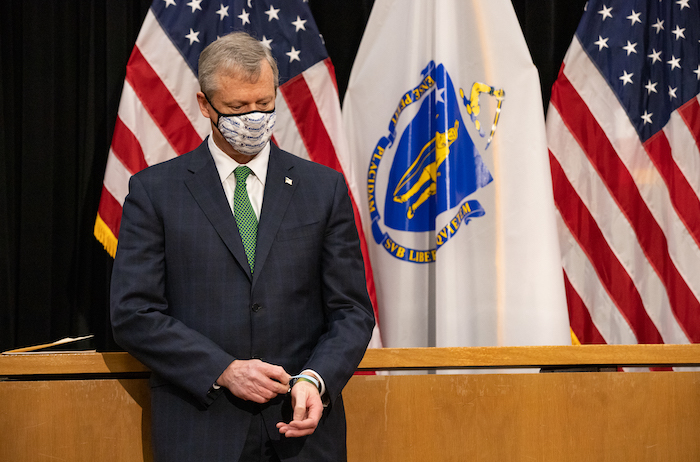latest
Governor Baker returns abortion access plan to legislature

By Chris Lisinski
State House News Service
Gov. Charlie Baker announced opposition Friday to allowing 16- and 17-year-olds in Massachusetts to acquire abortions without consent from a parent or a judge, setting up a potential battle with the Legislature’s Democratic supermajority even as he supported other abortion access proposals.
Baker returned the abortion policy section of the fiscal 2021 budget with a proposed amendment on Friday, offering a mixed review of what landed on his desk and seeking to change rather than rejecting the package.
He supported several sections, such as the codification of abortion rights in state law and a provision allowing the procedure after 24 weeks of pregnancy in cases with a fatal fetal anomaly.
“These are important changes to protect a women’s reproductive rights and autonomy in the Commonwealth, and I support them,” Baker wrote in a letter to lawmakers Friday. “However, I cannot support the other ways that this section expands the availability of late-term abortions and permits minors age 16 and 17 to get an abortion without the consent of a parent or guardian.”
The Republican governor proposed an amendment to the Legislature’s abortion language, which had been built on the so-called ROE Act, placing the onus back on Democratic House and Senate leaders with only about three weeks left in the two-year lawmaking session.
Lawmakers can agree to Baker’s proposed changes, amend them further, or double down on the proposal they originally passed and send that back to the governor.
Under the spending bill compromise that lawmakers sent to Baker last week, which the governor signed, Massachusetts would have lowered the age to receive an abortion without parental or judicial consent from 18 to 16, effectively granting 16- and 17-year-olds the ability to seek the procedure on their own.
Activists had argued that setting the threshold at 18 forces teenagers who survived incest or who do not have supportive families to face a difficult situation, caught between approaching parents who might react negatively or the sometimes traumatic judicial system.
Baker opposed reducing the age to 16, but he backed other changes lawmakers proposed to the process, such as requiring the consent of a single parent rather than two and allowing the court hearings to occur via teleconference.
He also suggested changing the language of another section, which allows abortions after 24 weeks of pregnancy in the case of a lethal fetal anomaly, to more closely reflect the original House proposal rather than the final bill that emerged from conference committee negotiations.
In the version that Baker received, abortions would be permitted after 24 weeks “if it is necessary, in the best medical judgment of the physician, to preserve the patient’s physical or mental health.”
Baker’s language would change that condition to read “if a continuation of the pregnancy will impose, in the best medical judgment of the physician, a substantial risk to” the patient’s physical or mental health.
“This approach represents a compromise between current law and the approach of the Legislature,” Lizzy Guyton, Baker’s communications director, said in a statement.
Another part of Baker’s amendment would impose civil penalties on practitioners who violate the limits on abortions after 24 weeks of pregnancy. Professionals would face revocation of their license and a fine of up to $15,000, while fines would also apply to those who fail to maintain life-saving equipment or secure consent from patients in those situations.
The bill referred to as the ROE Act had gained little momentum for more than a year, even though a majority of lawmakers co-sponsored it, until House Speaker Robert DeLeo and Senate President Karen Spilka announced in November that they planned to take up reproductive health care legislation before the end of the session.
Both the House and Senate approved abortion amendments to their budget bills by margins surpassing two-thirds majorities — 108-49 in the House and 33-7 in the Senate — indicating that Democratic leaders would likely be able to collect enough votes to enact their original proposal over a potential veto.
Spilka’s office did not indicate any plans, saying only that they would “be reviewing his changes.” DeLeo’s office could not be reached for comment.
Abortion access advocates slammed Baker’s amendment. The ROE Act Coalition, a group that includes NARAL Pro-Choice Massachusetts, the Planned Parenthood Advocacy Fund of Massachusetts, and the American Civil Liberties Union of Massachusetts, said the proposal “perpetuates government interference in personal health care decisions.”
“The Governor cannot have it both ways: He cannot call himself pro-choice and keep anti-choice restrictions in place. Current law in Massachusetts is broken, and this amendment maintains the state’s greatest barriers to care,” the coalition said. “For decades, medically unnecessary barriers to abortion have sent people out of state, forced young people to go before a judge, and delayed and denied care. Under Governor Baker’s amendment these hardships will continue. These barriers disproportionately harm people of color and people with low incomes.”






You must be logged in to post a comment Login